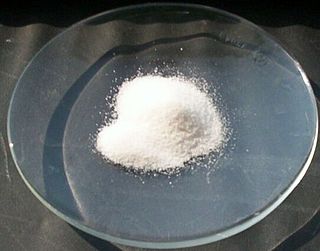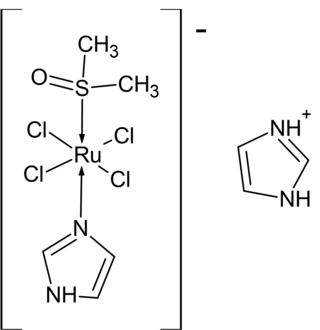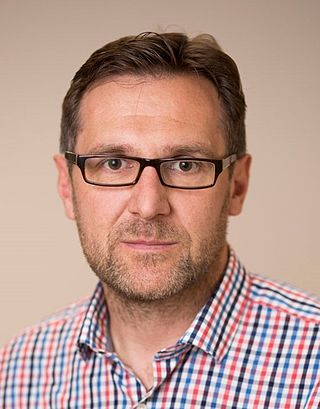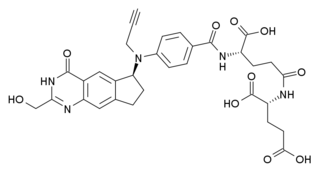The following outline is provided as an overview of and topical guide to chemistry:
Bioinorganic chemistry is a field that examines the role of metals in biology. Bioinorganic chemistry includes the study of both natural phenomena such as the behavior of metalloproteins as well as artificially introduced metals, including those that are non-essential, in medicine and toxicology. Many biological processes such as respiration depend upon molecules that fall within the realm of inorganic chemistry. The discipline also includes the study of inorganic models or mimics that imitate the behaviour of metalloproteins.

Cisplatin is a chemical compound with formula cis-[Pt(NH3)2Cl2]. It is a coordination complex of platinum that is used as a chemotherapy medication used to treat a number of cancers. These include testicular cancer, ovarian cancer, cervical cancer, bladder cancer, head and neck cancer, esophageal cancer, lung cancer, mesothelioma, brain tumors and neuroblastoma. It is given by injection into a vein.

Arsenic trioxide, sold under the brand name Trisenox among others, is an inorganic compound with the formula As
2O
3. As an industrial chemical, its major uses include the manufacture of wood preservatives, pesticides, and glass. It is also used as a medication to treat a type of cancer known as acute promyelocytic leukemia. For this use it is given by injection into a vein.

The Gottfried Wilhelm Leibniz Prize, or Leibniz Prize, is awarded by the German Research Foundation to "exceptional scientists and academics for their outstanding achievements in the field of research". Since 1986, up to ten prizes have been awarded annually to individuals or research groups working at a research institution in Germany or at a German research institution abroad. It is considered the most important research award in Germany.

KRAS is a gene that provides instructions for making a protein called K-Ras, a part of the RAS/MAPK pathway. The protein relays signals from outside the cell to the cell's nucleus. These signals instruct the cell to grow and divide (proliferate) or to mature and take on specialized functions (differentiate). It is called KRAS because it was first identified as a viral oncogene in the KirstenRAt Sarcoma virus. The oncogene identified was derived from a cellular genome, so KRAS, when found in a cellular genome, is called a proto-oncogene.

Eribulin, sold under the brand name Halaven among others, is an anti-cancer medication used to treat breast cancer and liposarcoma.
The Faculty of Chemistry and Earth Sciences is one of twelve faculties at the University of Heidelberg. It comprises the Institute of Inorganic Chemistry, Institute of Organic Chemistry, Institute of Physical Chemistry, Institute of Geography, Institute of Geology and Paleontology, Institute of Mineralogy, and the Institute of Environmental Geochemistry. Chemistry was established as a separate discipline at the University of Heidelberg in 1817 with Leopold Gmelin being appointed ordinary professor of chemistry and medicine. 1895 is considered to be the date of foundation of Geography at the University of Heidelberg as it was from this year on that lectures in physical and mathematical geography were held on a regular basis. In 1899 the first professorship in geography was established, filled by Alfred Hettner.

Dexanabinol is a synthetic cannabinoid derivative in development by e-Therapeutics plc. It is the "unnatural" enantiomer of the potent cannabinoid agonist HU-210. Unlike other cannabinoid derivatives, HU-211 does not act as a cannabinoid receptor agonist, but instead as an NMDA antagonist. It therefore does not produce cannabis-like effects, but is anticonvulsant and neuroprotective, and is widely used in scientific research as well as currently being studied for applications such as treating head injury, stroke, or cancer. It was shown to be safe in clinical trials and is currently undergoing Phase I trials for the treatment of brain cancer and advanced solid tumors.

Phosphoinositide 3-kinase inhibitors are a class of medical drugs that are mainly used to treat advanced cancers. They function by inhibiting one or more of the phosphoinositide 3-kinase (PI3K) enzymes, which are part of the PI3K/AKT/mTOR pathway. This signal pathway regulates cellular functions such as growth and survival. It is strictly regulated in healthy cells, but is always active in many cancer cells, allowing the cancer cells to better survive and multiply. PI3K inhibitors block the PI3K/AKT/mTOR pathway and thus slow down cancer growth. They are examples of a targeted therapy. While PI3K inhibitors are an effective treatment, they can have very severe side effects and are therefore only used if other treatments have failed or are not suitable.

Stephen James Lippard is the Arthur Amos Noyes Emeritus Professor of Chemistry at the Massachusetts Institute of Technology. He is considered one of the founders of bioinorganic chemistry, studying the interactions of nonliving substances such as metals with biological systems. He is also considered a founder of metalloneurochemistry, the study of metal ions and their effects in the brain and nervous system. He has done pioneering work in understanding protein structure and synthesis, the enzymatic functions of methane monooxygenase (MMO), and the mechanisms of cisplatin anticancer drugs. His work has applications for the treatment of cancer, for bioremediation of the environment, and for the development of synthetic methanol-based fuels.

NAMI-A is the imidazolium]] salt of the coordination complex [RuCl4(dmso)(C3N2H4)]− where dmso is dimethylsulfoxide and C3N2H4 is imidazole Together with KP1019 and BOLD-100, NAMI-A has been investigated as an anticancer agent.
Ruthenium anti-cancer drugs are coordination complexes of ruthenium complexes that have anticancer properties. They promise to provide alternatives to platinum-based drugs for anticancer therapy. No ruthenium anti-cancer drug has been commercialized.

Christian G. Hartinger is an Austrian-born New Zealand bioinorganic chemist known for his work in metal-based anticancer drugs. In 2022 he was elected a Fellow of the Royal Society Te Apārangi.

KP1019, or indazole trans-[tetrachlorobis(1H-indazole)ruthenate(III)], is one of four ruthenium anti-cancer drugs to enter into phase I clinical trials, the others being BOLD-100, NAMI-A and TLD-1433. Research into ruthenium-based drugs has provided novel alternatives for platinum-based chemotherapeutics such as Cisplatin and its derivatives. KP1019 is useful for metastatic tumors and cis-platin resistant tumors. It exhibits potent cytotoxicity against primary tumors, particularly in colorectal cancer.

ONX-0801 is an experimental drug that has been developed to target ovarian cancer. It is a folate receptor alpha mediated thymidylate synthase inhibitor.
Che Chi-ming, is a Hong Kong chemist currently holding Zhou Guangzhao Professorship in Natural Sciences, following a Dr. Hui Wai-Haan's Chair of Chemistry at the University of Hong Kong (HKU). In 1995, he became the first scientist from Hong Kong to be elected as a member of the Chinese Academy of Sciences. As of today, he remains the youngest academician of the CAS ever to be elected. He is known for extensive work in inorganic chemistry, photochemistry, and medicinal chemistry.
Angela Casini is a medicinal and inorganic chemist who works on metal-based compounds as therapeutic agents. She was awarded the 2012 European Medal for Bio-Inorganic Chemistry and made the 2019 American Chemical Society Inorganic Lecturer.

BOLD-100, or sodium trans-[tetrachlorobis (1H-indazole)ruthenate(III)], is a ruthenium-based anti-cancer therapeutic in clinical development. As of November 2021, BOLD-100 was being tested in a Phase 1b clinical trial in patients with advanced gastrointestinal cancers in combination with the chemotherapy regimen FOLFOX. BOLD-100 is being developed by Bold Therapeutics Inc.













